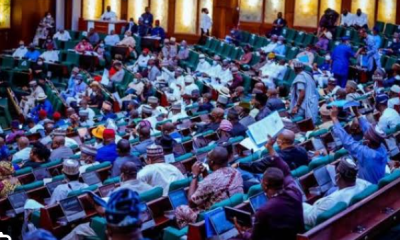Economy
Imported food inflation hits 42% as FG’s duty waiver delays

Nigeria’s imported food inflation surged to 42.29 per cent in November 2024, according to the Consumer Price Index report released by the National Bureau of Statistics.
This represents a significant rise from 23.74 per cent recorded in November 2023, marking an 18.55 percentage point year-on-year increase.
On a month-on-month basis, the inflation rate increased from 40.96 per cent in October 2024, a 1.33 percentage point rise in just one month.
The data highlights the relentless upward trajectory of imported food inflation throughout 2024, which began at 26.29 per cent in January.
By October, the inflation rate had crossed the 40 per cent threshold, and November’s figure of 42.29 per cent is the highest recorded in the past two years.
This sharp rise has been attributed to multiple factors, including currency devaluation, global supply chain disruptions, and inefficiencies in domestic policies.
The Federal Government’s attempt to address the situation through a duty waiver on imported food has been fraught with delays.
In July 2024, the Federal Government announced a 150-day duty-free import window for food commodities as it stepped up efforts to tackle rising inflation, which had impoverished many Nigerians.
The commodities include maize, husked brown rice, wheat and cowpeas. Under this arrangement, imported food commodities will be subjected to a Recommended Retail Price.
It was designed to reduce import costs and make staple foods more affordable. However, the implementation has stalled due to bureaucratic delays.
The PUNCH earlier reported that the average price of imported high-quality rice has surged by 144.77 per cent year-on-year as the Federal Government delays implementing its duty-free food policy.
Since the announcement of the policy, the price of one kilogramme of imported rice has risen by 3.21 per cent, climbing from N2,329.05 in July to N2,403.86 in September.
Economy
SEE Current Black Market Dollar (USD) To Naira (NGN) Exchange Rate

Current Black Market Dollar (USD) To Naira (NGN) Exchange Rate
As of Thursday, May 15, 2025, the exchange rate of the United States Dollar (USD) to the Nigerian Naira (NGN) in the Lagos parallel market, commonly referred to as the black market, stands as follows:
Buying Rate: ₦1,625 per $1
Selling Rate: ₦1,630 per $1
These rates were sourced from key operators within the Bureau De Change (BDC) segment of the market and may fluctuate depending on demand, location, and volume of the transaction.
Important Disclaimer from the Central Bank of Nigeria (CBN)
The Central Bank of Nigeria has repeatedly cautioned against the use of the parallel market for foreign exchange transactions. The apex bank maintains that the official forex market is the only recognized channel for buying and selling foreign currency. Individuals or businesses in need of foreign exchange are strongly advised to approach their respective commercial banks or authorized dealers.
Official CBN Exchange Rate – May 15, 2025
In contrast to the rates observed in the black market, the official rates published by the CBN on the same date are:
Highest Rate: ₦1,604 per $1
Lowest Rate: ₦1,597 per $1
These rates reflect the regulated interbank market and may differ from bank-to-bank or based on transaction purposes such as international payments, imports, and remittances.
It’s important to note that the foreign exchange rates quoted here are indicative and may not reflect the exact rates offered to individuals or businesses at any given moment. Factors such as the location of exchange, prevailing market conditions, transaction volume, and negotiations between parties can lead to slight variations.
Final Thoughts
As the Naira continues to fluctuate against the Dollar, both in the official and unofficial markets, it is crucial for individuals and businesses to monitor exchange rate trends closely. For the most accurate and up-to-date rates, always consult authorized BDC operators or your local bank.
Economy
SEE Current Black Market Dollar (USD) To Naira (NGN) Exchange Rate

Current Black Market Dollar (USD) To Naira (NGN) Exchange Rate
As of Tuesday, May 13, 2025, the exchange rate for the U.S. dollar to the Nigerian naira at the Lagos Parallel Market commonly known as the black market or Aboki FX—stands as follows:
Buying Rate: ₦1,630 per dollar
Selling Rate: ₦1,635 per dollar
This information is based on data obtained from traders at Bureau De Change (BDC) outlets in Lagos.
Important Notice:
The Central Bank of Nigeria (CBN) does not recognize the black market as an official channel for foreign exchange transactions. Individuals and businesses seeking to access forex are advised to go through authorized financial institutions, such as commercial banks.
Dollar to Naira – Black Market Rate Today
Exchange Type Rate (₦)
Buying ₦1,630
Selling ₦1,635
Dollar to Naira – CBN Official Rate
At the Central Bank of Nigeria’s official window, the dollar exchanged at varying rates today:
Highest Rate: ₦1,610
Lowest Rate: ₦1,597
Note:
Foreign exchange rates may differ depending on location, volume, and the dealer. The figures provided here are for informational purposes and may not reflect the exact rates offered to buyers or sellers in real-time.
Economy
CBN launches new platform, targets $1bn monthly diaspora remittances

The Central Bank of Nigeria, in collaboration with the Nigeria Inter-Bank Settlement System, has launched the Non-Resident Bank Verification Number platform, an initiative aimed at enhancing financial access for Nigerians in the diaspora.
The platform, which enables Nigerians abroad to obtain their Bank Verification Number remotely, removes the need for physical presence in Nigeria.
Speaking at the event in Abuja on Tuesday, CBN Governor, Mr. Olayemi Cardoso, described the platform as a key milestone in the country’s financial inclusion journey.
He noted that the NRBVN would ease the long-standing challenges faced by Nigerians in the diaspora who previously had to be physically present in Nigeria for BVN registration.
“For too long, many Nigerians abroad have faced difficulties accessing financial services at home due to physical verification requirements,” Cardoso said. “The NRBVN changes that. Through secure digital verification and robust Know Your Customer processes, Nigerians worldwide will now be able to access financial services more easily and affordably.”
The governor added that the NRBVN was not just a solution for financial access, but a step towards a more inclusive, innovative, and prosperous financial ecosystem.
“We are building a secure, efficient, and inclusive financial ecosystem for Nigerians globally,” he remarked. “This platform is not just about financial access, it’s about national inclusion, innovation, and shared prosperity.”
Cardoso also highlighted the growth in remittance flows, which increased from $3.3bn in 2023 to $4.73bn in 2024. He attributed this rise to recent reforms, including the introduction of the willing buyer, willing seller FX regime.
With the launch of the NRBVN, the CBN is targeting $1bn in monthly remittances.
“With the introduction of NRBVN and complementary policy measures, we are optimistic about achieving our ambitious target of $1bn in monthly remittance flows, a goal we believe is entirely achievable given the growing trust and convenience in formal remittance channels,” Cardoso said.
The event also featured a presentation by the Managing Director/CEO of NIBSS, Mr Premier Oiwoh, who detailed the technical and operational aspects of the NRBVN platform.
Oiwoh emphasised that the platform adheres to global standards, incorporating stringent Anti-Money Laundering and KYC compliance protocols to ensure transparency and security.
The Deputy Governor, Economic Policy, CBN, Mr Muhammad Abdullahi, also addressed the gathering, describing the NRBVN as a transformative tool for enhancing the banking experience for Nigeria’s diaspora.
He urged stakeholders to collaborate in refining the platform to meet the evolving needs of the diaspora community.
He further emphasised that the initiative would strengthen economic ties between Nigeria and its global citizens, and ultimately drive sustainable economic growth.
“Together, we stand at the threshold of a new era, poised to deepen the trust, enhance remittance growth, and forge a stronger, more meaningful connection between Nigeria and its global citizens,” Abdullahi said.
The NRBVN platform is part of a broader framework that includes the Non-Resident Ordinary Account and Non-Resident Nigerian Investment Account, which provide Nigerians in the diaspora with access to savings, mortgages, insurance, pensions, and investment opportunities in Nigeria’s capital markets.
Under current regulations, diasporans will have the flexibility to repatriate the proceeds of their investments.
The launch of the NRBVN platform marks a crucial step in the CBN’s efforts to improve financial inclusion and harness the economic potential of Nigeria’s diaspora.
-

 Opinion22 hours ago
Opinion22 hours agoHuman Capital Devt: The Rep Paul Nnamchi
-

 News16 hours ago
News16 hours agoAlleged cyber bullying: IGP re-arraigns VDM
-

 News18 hours ago
News18 hours agoBREAKING: PDP, NNPP Rep members abandon parties, lace boots with APC
-

 News22 hours ago
News22 hours agoSEE Current Black Market Dollar (USD) To Naira (NGN) Exchange Rate
-

 News22 hours ago
News22 hours agoNnamdi Kanu’s family wants court to ban NAN coverage of son’s trial or allow live streaming
-

 News15 hours ago
News15 hours agoBill To Make Voting Compulsory For Nigerians Passes Second Reading
-

 News22 hours ago
News22 hours agoPDP Summons Emergency Meeting As South-East Threatens Exodus
-

 News21 hours ago
News21 hours agoAlleged scam: Coalition wants EFCC to charge ex-Chairman, Bawa to court immediately


















